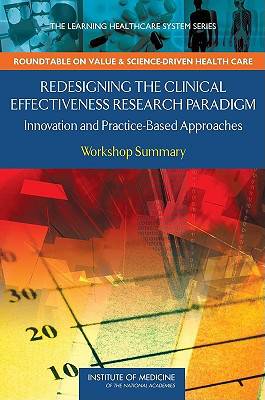
- Afhalen na 1 uur in een winkel met voorraad
- Gratis thuislevering in België vanaf € 30
- Ruim aanbod met 7 miljoen producten
- Afhalen na 1 uur in een winkel met voorraad
- Gratis thuislevering in België vanaf € 30
- Ruim aanbod met 7 miljoen producten
Redesigning the Clinical Effectiveness Research Paradigm
Innovation and Practice-Based Approaches: Workshop Summary
Institute of Medicine, Roundtable on Value and Science-Driven Health CareOmschrijving
Recent scientific and technological advances have accelerated our understanding of the causes of disease development and progression, and resulted in innovative treatments and therapies. Ongoing work to elucidate the effects of individual genetic variation on patient outcomes suggests the rapid pace of discovery in the biomedical sciences will only accelerate. However, these advances belie an important and increasing shortfall between the expansion in therapy and treatment options and knowledge about how these interventions might be applied appropriately to individual patients. The impressive gains made in Americans' health over the past decades provide only a preview of what might be possible when data on treatment effects and patient outcomes are systematically captured and used to evaluate their effectiveness. Needed for progress are advances as dramatic as those experienced in biomedicine in our approach to assessing clinical effectiveness.
In the emerging era of tailored treatments and rapidly evolving practice, ensuring the translation of scientific discovery into improved health outcomes requires a new approach to clinical evaluation. A paradigm that supports a continual learning process about what works best for individual patients will not only take advantage of the rigor of trials, but also incorporate other methods that might bring insights relevant to clinical care and endeavor to match the right method to the question at hand.
The Institute of Medicine Roundtable on Value & Science-Driven Health Care's vision for a learning healthcare system, in which evidence is applied and generated as a natural course of care, is premised on the development of a research capacity that is structured to provide timely and accurate evidence relevant to the clinical decisions faced by patients and providers. As part of the Roundtable's Learning Healthcare System series of workshops, clinical researchers, academics, and policy makers gathered for the workshop Redesigning the Clinical Effectiveness Research Paradigm: Innovation and Practice-Based Approaches. Participants explored cutting-edge research designs and methods and discussed strategies for development of a research paradigm to better accommodate the diverse array of emerging data resources, study designs, tools, and techniques. Presentations and discussions are summarized in this volume.
Specificaties
Betrokkenen
- Auteur(s):
- Uitgeverij:
Inhoud
- Aantal bladzijden:
- 442
- Taal:
- Engels
- Reeks:
Eigenschappen
- Productcode (EAN):
- 9780309119887
- Verschijningsdatum:
- 20/10/2010
- Uitvoering:
- Paperback
- Formaat:
- Trade paperback (VS)
- Afmetingen:
- 150 mm x 226 mm
- Gewicht:
- 680 g

Alleen bij Standaard Boekhandel
Beoordelingen
We publiceren alleen reviews die voldoen aan de voorwaarden voor reviews. Bekijk onze voorwaarden voor reviews.











